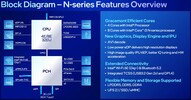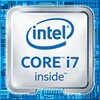Intel Processor N50 vs Intel Core i7-7700K vs Intel Xeon E3-1535M v6
Intel Processor N50
► remove from comparison
Der Intel Processor N50 ist eine Notebook-CPU der Einstiegsklasse der Alder Lake-N Serie. Er wurde im Januar 2023 vorgestellt und bietet 2 der 8 Effizienzkerne (E-Kerne, Gracemont Architektur) mit bis zu 3,4 GHz. Die E-Kerne unterstützen kein HyperThreading und sollen eine vergleichbare Performance wie alte Skylake Kerne bieten (z.B. i7-6300HQ).
Performance
Die Performance des N50 sollte vergleichbar zu alten Dual-Core-Prozessoren mit Skylake-Kernen sein, z.B. Core m3-8100Y (2x 3.4 GHz, 5W). Der nächst-schnellere Intel Processor N100 sollte durch die zwei zusätzlichen Kerne eine deutlich bessere Multi-Thread-Performance aufweisen.
Grafikeinheit
Alder Lake-N integriert eine Xe basierende Grafikeinheit mit bis zu 32 EUs (Execution Units). Davon sind im N50 nur 16 aktiviert und takten von 750 MHz relativ gering. Durch die geringe Kernanzahl, Taktung und die Einschränkung auf Single-Channel-RAM, ist die Spieleleistung aber deutlich eingeschränkt.
Features
Der kleine Alder-Lake-N-Chip integriert teilweise Wi-Fi 6E und Bluetooth 5.2 (im PCH). Der integrierte Speicherkontroller unterstützt Single-Channel DDR4-3200, DDR5-4800 und LPDDR5-4800. Die Media Engine Quick Sync kann nun auch AV1 dekodieren (wie bei Alder Lake). Für die externe Anbindung von Peripherie unterstützt der PCH PCIe Gen3 x9.
Leistungsaufnahme
Der N50 ist nur mit 6 Watt (PL1) TDP spezifiziert und eignet sich daher auch für lüfterlose Systeme. Gefertigt wird der Prozessor im verbesserten Intel 7 Prozess (10 nm SuperFin).
Intel Core i7-7700K
► remove from comparison
Der Intel Core i7-7700K ist ein High-End Quad-Core Desktop-Prozessor auf Basis der Kaby-Lake-Architektur, der im August 2015 vorgestellt wurde. Die in einem verbesserten 14-Nanometer-Prozess gefertigte CPU taktet mit 4,2 bis 4,5 GHz und kann dank Hyper-Threading bis zu 8 Threads parallel bearbeiten. Als sogenanntes "K"-Modell verfügt der Core i7-7700K über einen freien Multiplikator und lässt sich so besonders einfach übertakten.
Performance
Dank 200 (Basis) bzw 300 MHz (Boost) höherer Taktfrequenz, kann sich der i7-7700K einige Prozent vor dem alten Core i7-6700K (4 - 4,2 GHz) und auch dem i7-4790K positionieren. Die Leistung pro Takt ist jedoch identisch zum Skylake Modell. Auch anspruchsvollste Programme und Spiele werden von der High-End-CPU problemlos bewältigt.
Grafikeinheit
Für Grafikberechnungen zeigt sich die im Prozessor integrierte Intel HD Graphics 630 mit 24 EUs (Execution Units) verantwortlich, die mit 350 - 1150 MHz taktet. Die Leistung ist vergleichbar mit der alten Intel HD Graphics 530 und siedelt sich daher im absoluten Low-End-Bereich an, sodass aktuelle Spiele allenfalls in niedrigen Einstellungen flüssig dargestellt werden.
Leistungsaufnahme
Der TDP ist weiterhin bei 91 Watt festgelegt, Intel spricht jedoch von einer leicht verbesserten Effizienz bei Kaby Lake.
Intel Xeon E3-1535M v6
► remove from comparison
Der Intel Xeon E3-1535M v6 ist ein schneller Quad-Core-Prozessor für Notebooks auf Basis der Kaby-Lake-Architektur, der im Jänner 2017 vorgestellt wurde. Zum Zeitpunkt der Präsentation stellt er das Topmodell seiner Baureihe dar und schlägt auch den schnellsten Consumer Kaby-Lake-H um 100-200 MHz bei den Turbo-Taktraten. Neben den vier CPU-Kernen inklusive Hyper-Threading-Support, die mit 3,1 bis 4,2 GHz takten (4 Kerne: max. 3,9 GHz, 2 Kerne: max. 4,1 GHz), integriert der Prozessor auch eine HD Graphics P630 Grafikeinheit sowie einen Dual-Channel-Speichercontroller (DDR3L-1600/DDR4-2133). Die Fertigung erfolgt in einem 14-Nanometer-Prozess mit FinFET-Transistoren.
Architektur
Im Vergleich mit Skylake hat Intel die zugrundeliegende Mikroarchitektur praktisch unverändert übernommen, sodass sich keine Unterschiede in der Pro-MHz-Leistung ergeben. Überarbeitet wurde lediglich die Speed-Shift-Technik zur schnelleren dynamischen Anpassung von Spannungen und Taktraten, zudem gestattet der gereifte 14-Nanometer-Prozess deutlich höhere Frequenzen und eine bessere Energieeffizienz als bislang.
Performance
Durch die leicht erhöhten Turbo-Taktraten (100-200 MHz je nach Anzahl der verwendeten Kerne) verglichen mit dem Consumer Topmodell i7-7920HQ, steigt die Performance auch minimal an (wenn die Kühlung ausreicht). Dadurch kann sich daher an die Spitze der mobilen Prozessoren Anfang 2017 setzen. Dadurch reicht die Leistung auch für sehr anspruchsvolle Aufgaben und ist auf einem Level mit schnellen Desktop Quad-Core Prozessoren.
Grafikeinheit
Die integrierte professionelle Intel HD Graphics P630 Grafikkarte verfügt wie die alte HD Graphics P530 über 24 Ausführungseinheiten (EUs) und taktet in diesem Fall mit 350 - 1100 MHz. Die Performance hängt stark vom verwendeten Arbeitsspeicher ab; mit schnellem DDR4-2133 im Dual-Channel-Betrieb sollte die Leistung mit einer dedizerten Nvidia GeForce 920M vergleichbar sein. Laut Intel entspricht die Leistung der P630 der Performance der P530 im SpecViewPerf 12. Sie bietet zertifzierte Treiber für 15 professionelle Anwendungen.
Anders als Skylake kann Kaby Lake nun auch H.265/HEVC im Main10-Profil mit 10 Bit Farbtiefe sowie Googles VP9-Codec in Hardware decodieren. Die Anfang Jänner eingeführten Dual-Core-Kaby-Lake-Prozessoren sollten außerdem schon HDCP 2.2 beherrschen.
Leistungsaufnahme
Die Fertigung erfolgt in einem weiter verbesserten 14-Nanometer-Prozess mit FinFET-Transistoren, wodurch die Energieeffizienz nochmals spürbar gestiegen ist. Die TDP wird mit 45 Watt spezifiziert und kann je nach Einsatzzweck auch auf 35 Watt abgesenkt werden vom Notebookhersteeller (cTDP Down). Dadurch verringert sich jedoch auch die Durchschnittliche Leistung, da der Turbo nicht so lange gehalten wird.
| Model | Intel Processor N50 | Intel Core i7-7700K | Intel Xeon E3-1535M v6 | ||||||||||||||||||||||||||||||||||||||||||||||||||||||||||||||||||||||||||||||||||||||||||||||||||||||||||||||||||||||||||||||||||||||||||||||||||||||||||||||||||||||||||||||||||||||||||||||||||||||||||||||||||||||||||||||||||||||||||||||||||||||||||||||||||||||||||||||||||||||||||||||||||||||||||||||||||||||||||||||||||||||||||||||||||||||||||||||||||||||||||||
| Codename | Alder Lake-N | Kaby Lake | Kaby Lake | ||||||||||||||||||||||||||||||||||||||||||||||||||||||||||||||||||||||||||||||||||||||||||||||||||||||||||||||||||||||||||||||||||||||||||||||||||||||||||||||||||||||||||||||||||||||||||||||||||||||||||||||||||||||||||||||||||||||||||||||||||||||||||||||||||||||||||||||||||||||||||||||||||||||||||||||||||||||||||||||||||||||||||||||||||||||||||||||||||||||||||||
| Series | Intel Alder Lake-N | Intel Kaby Lake | Intel Kaby Lake | ||||||||||||||||||||||||||||||||||||||||||||||||||||||||||||||||||||||||||||||||||||||||||||||||||||||||||||||||||||||||||||||||||||||||||||||||||||||||||||||||||||||||||||||||||||||||||||||||||||||||||||||||||||||||||||||||||||||||||||||||||||||||||||||||||||||||||||||||||||||||||||||||||||||||||||||||||||||||||||||||||||||||||||||||||||||||||||||||||||||||||||
| Serie: Kaby Lake Kaby Lake |
|
|
| ||||||||||||||||||||||||||||||||||||||||||||||||||||||||||||||||||||||||||||||||||||||||||||||||||||||||||||||||||||||||||||||||||||||||||||||||||||||||||||||||||||||||||||||||||||||||||||||||||||||||||||||||||||||||||||||||||||||||||||||||||||||||||||||||||||||||||||||||||||||||||||||||||||||||||||||||||||||||||||||||||||||||||||||||||||||||||||||||||||||||||||
| Clock | 1000 - 3400 MHz | 4200 - 4500 MHz | 3100 - 4200 MHz | ||||||||||||||||||||||||||||||||||||||||||||||||||||||||||||||||||||||||||||||||||||||||||||||||||||||||||||||||||||||||||||||||||||||||||||||||||||||||||||||||||||||||||||||||||||||||||||||||||||||||||||||||||||||||||||||||||||||||||||||||||||||||||||||||||||||||||||||||||||||||||||||||||||||||||||||||||||||||||||||||||||||||||||||||||||||||||||||||||||||||||||
| L3 Cache | 6 MB | 8 MB | 8 MB | ||||||||||||||||||||||||||||||||||||||||||||||||||||||||||||||||||||||||||||||||||||||||||||||||||||||||||||||||||||||||||||||||||||||||||||||||||||||||||||||||||||||||||||||||||||||||||||||||||||||||||||||||||||||||||||||||||||||||||||||||||||||||||||||||||||||||||||||||||||||||||||||||||||||||||||||||||||||||||||||||||||||||||||||||||||||||||||||||||||||||||||
| Cores / Threads | 2 / 2 2 x 3.4 GHz Intel Gracemont E-Core | 4 / 8 | 4 / 8 | ||||||||||||||||||||||||||||||||||||||||||||||||||||||||||||||||||||||||||||||||||||||||||||||||||||||||||||||||||||||||||||||||||||||||||||||||||||||||||||||||||||||||||||||||||||||||||||||||||||||||||||||||||||||||||||||||||||||||||||||||||||||||||||||||||||||||||||||||||||||||||||||||||||||||||||||||||||||||||||||||||||||||||||||||||||||||||||||||||||||||||||
| TDP | 6 Watt | 91 Watt | 45 Watt | ||||||||||||||||||||||||||||||||||||||||||||||||||||||||||||||||||||||||||||||||||||||||||||||||||||||||||||||||||||||||||||||||||||||||||||||||||||||||||||||||||||||||||||||||||||||||||||||||||||||||||||||||||||||||||||||||||||||||||||||||||||||||||||||||||||||||||||||||||||||||||||||||||||||||||||||||||||||||||||||||||||||||||||||||||||||||||||||||||||||||||||
| Technology | 10 nm | 14 nm | 14 nm | ||||||||||||||||||||||||||||||||||||||||||||||||||||||||||||||||||||||||||||||||||||||||||||||||||||||||||||||||||||||||||||||||||||||||||||||||||||||||||||||||||||||||||||||||||||||||||||||||||||||||||||||||||||||||||||||||||||||||||||||||||||||||||||||||||||||||||||||||||||||||||||||||||||||||||||||||||||||||||||||||||||||||||||||||||||||||||||||||||||||||||||
| max. Temp. | 105 °C | 100 °C | |||||||||||||||||||||||||||||||||||||||||||||||||||||||||||||||||||||||||||||||||||||||||||||||||||||||||||||||||||||||||||||||||||||||||||||||||||||||||||||||||||||||||||||||||||||||||||||||||||||||||||||||||||||||||||||||||||||||||||||||||||||||||||||||||||||||||||||||||||||||||||||||||||||||||||||||||||||||||||||||||||||||||||||||||||||||||||||||||||||||||||||
| iGPU | Intel UHD Graphics Xe 16EUs (Tiger Lake-H) ( - 750 MHz) | Intel HD Graphics 630 (350 - 1150 MHz) | Intel HD Graphics P630 (300 - 1150 MHz) | ||||||||||||||||||||||||||||||||||||||||||||||||||||||||||||||||||||||||||||||||||||||||||||||||||||||||||||||||||||||||||||||||||||||||||||||||||||||||||||||||||||||||||||||||||||||||||||||||||||||||||||||||||||||||||||||||||||||||||||||||||||||||||||||||||||||||||||||||||||||||||||||||||||||||||||||||||||||||||||||||||||||||||||||||||||||||||||||||||||||||||||
| Architecture | x86 | x86 | x86 | ||||||||||||||||||||||||||||||||||||||||||||||||||||||||||||||||||||||||||||||||||||||||||||||||||||||||||||||||||||||||||||||||||||||||||||||||||||||||||||||||||||||||||||||||||||||||||||||||||||||||||||||||||||||||||||||||||||||||||||||||||||||||||||||||||||||||||||||||||||||||||||||||||||||||||||||||||||||||||||||||||||||||||||||||||||||||||||||||||||||||||||
| Announced | |||||||||||||||||||||||||||||||||||||||||||||||||||||||||||||||||||||||||||||||||||||||||||||||||||||||||||||||||||||||||||||||||||||||||||||||||||||||||||||||||||||||||||||||||||||||||||||||||||||||||||||||||||||||||||||||||||||||||||||||||||||||||||||||||||||||||||||||||||||||||||||||||||||||||||||||||||||||||||||||||||||||||||||||||||||||||||||||||||||||||||||||
| Manufacturer | ark.intel.com | ||||||||||||||||||||||||||||||||||||||||||||||||||||||||||||||||||||||||||||||||||||||||||||||||||||||||||||||||||||||||||||||||||||||||||||||||||||||||||||||||||||||||||||||||||||||||||||||||||||||||||||||||||||||||||||||||||||||||||||||||||||||||||||||||||||||||||||||||||||||||||||||||||||||||||||||||||||||||||||||||||||||||||||||||||||||||||||||||||||||||||||||
| L1 Cache | 256 KB | 256 KB | |||||||||||||||||||||||||||||||||||||||||||||||||||||||||||||||||||||||||||||||||||||||||||||||||||||||||||||||||||||||||||||||||||||||||||||||||||||||||||||||||||||||||||||||||||||||||||||||||||||||||||||||||||||||||||||||||||||||||||||||||||||||||||||||||||||||||||||||||||||||||||||||||||||||||||||||||||||||||||||||||||||||||||||||||||||||||||||||||||||||||||||
| L2 Cache | 1 MB | 1 MB | |||||||||||||||||||||||||||||||||||||||||||||||||||||||||||||||||||||||||||||||||||||||||||||||||||||||||||||||||||||||||||||||||||||||||||||||||||||||||||||||||||||||||||||||||||||||||||||||||||||||||||||||||||||||||||||||||||||||||||||||||||||||||||||||||||||||||||||||||||||||||||||||||||||||||||||||||||||||||||||||||||||||||||||||||||||||||||||||||||||||||||||
| Socket | FCLGA1151 | ||||||||||||||||||||||||||||||||||||||||||||||||||||||||||||||||||||||||||||||||||||||||||||||||||||||||||||||||||||||||||||||||||||||||||||||||||||||||||||||||||||||||||||||||||||||||||||||||||||||||||||||||||||||||||||||||||||||||||||||||||||||||||||||||||||||||||||||||||||||||||||||||||||||||||||||||||||||||||||||||||||||||||||||||||||||||||||||||||||||||||||||
| Features | DDR3(L)-1600/DDR4-2400 Memory Controller, HyperThreading, AVX, AVX2, AES-NI, TSX-NI, Quick Sync, Virtualization, vPro | Dual-Channel DDR4 Memory Controller, HyperThreading, AVX, AVX2, Quick Sync, Virtualization, AES-NI, SIPP, vPro, TXT | |||||||||||||||||||||||||||||||||||||||||||||||||||||||||||||||||||||||||||||||||||||||||||||||||||||||||||||||||||||||||||||||||||||||||||||||||||||||||||||||||||||||||||||||||||||||||||||||||||||||||||||||||||||||||||||||||||||||||||||||||||||||||||||||||||||||||||||||||||||||||||||||||||||||||||||||||||||||||||||||||||||||||||||||||||||||||||||||||||||||||||||
| $339 U.S. | $623 U.S. |
Benchmarks
Average Benchmarks Intel Processor N50 → 0% n=0
Average Benchmarks Intel Core i7-7700K → 0% n=0
Average Benchmarks Intel Xeon E3-1535M v6 → 0% n=0
* Smaller numbers mean a higher performance
1 This benchmark is not used for the average calculation













